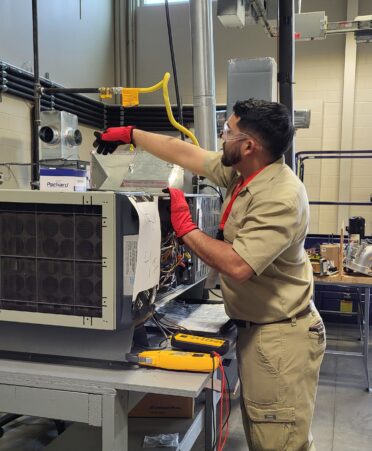(ROSENBERG, Texas) – Alyssa Lehnen loves working as an enrollment coach for the HVAC Technology program at Texas State Technical College’s Fort Bend County campus.
“My role as an enrollment coach is to assist students, traditional or nontraditional, coming into the HVAC program,” Lehnen said. “They are with me from the very beginning to the time that they graduate.”
Having one person be the advisor for the program comes with a lot of benefits for the students. For one, they do not have to re-explain their situation to a new person each time they need assistance.
“It will always be just that one person,” Lehnen said. “That way if they have changing circumstances or situations they are in, they don’t have to keep explaining it to a new person every time.”
Lehnen added that one of her primary responsibilities is helping students figure out which path toward graduation they should take.
“If a student is looking to get into the workforce right away or work for a specific company, they will often choose to go for a certificate because it is faster,” Lehnen said. “We offer both the residential certificate, which can be done in two semesters, and the traditional certificate 1, which can be done in three.”
Additionally, a certificate of completion 2 in HVAC Technology is available, taking four semesters to complete, as well as an Associate of Applied Science degree in HVAC Technology, which takes a total of five semesters. The primary difference between the two is the absence of traditional academic courses in the certificate route.
“If you want a managerial position in a company, you are going to need your associate degree,” Lehnen said. “If you want to start your own business, you’ll need a degree as well.”
Ultimately what works best for students is up to what they want. If they are looking to get hired and start working as soon as possible, a certificate would be the way to go. But if they are looking to start their own company, going after the associate degree would be a better option for them.
Lehnen began working at TSTC in November 2021. When she started, the program was in the process of transitioning into a hybrid performance-based education, or PBE, program. Lectures and assignments are done online at whatever pace the student feels comfortable with. On campus, students practice on lab equipment, talk with instructors and take mastery assessments.
“When I was hired by TSTC, I was assigned HVAC as my program,” Lehnen said. “PBE was brand-new at the time, so since then I have been learning right alongside the instructors and students.”
In PBE, students are able to finish courses early if they have mastered the material or take their time if they need extra help on certain lessons. The amount of time that students spend in the labs depends on the number of HVAC courses they are taking per semester.
In addition, when students graduate they get two transcripts, the first being the traditional transcript with their name, degree and date received. The other transcript breaks down the various skills they have learned and gained competency in during the program. This allows employers to see exactly what the graduates have learned, improving the likelihood of their being hired.
Lehnen feels lucky to be a part of the HVAC program and praises the instructors and students as being some of the very best.
“Sometimes people will ask, ‘I don’t know anything about HVAC. Will they teach me everything I need to know?'” Lehnen said. “The answer is always going to be yes.”
In Texas, heating, air conditioning, and refrigeration mechanics and installers earn a median annual salary of $48,720, according to onetonline.org. The website projected a 21% increase in the number of these jobs in the state from 2020 to 2030.
TSTC offers HVAC Technology at the East Williamson County, Fort Bend County, Harlingen, North Texas and Waco campuses.
Registration for TSTC’s fall semester is underway. For more information, go to tstc.edu.
